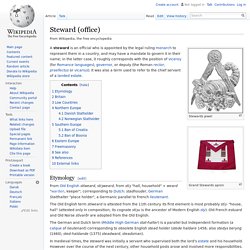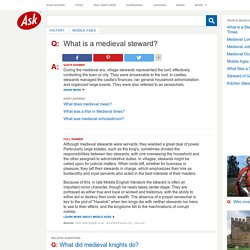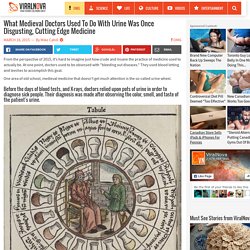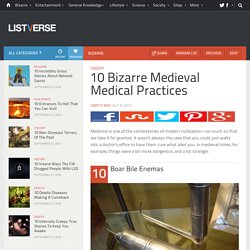

Steward (office) A steward is an official who is appointed by the legal ruling monarch to represent them in a country, and may have a mandate to govern it in their name; in the latter case, it roughly corresponds with the position of viceroy (for Romance languages), governor, or deputy (the Roman rector, praefectus or vicarius).

It was also a term used to refer to the chief servant of a landed estate. From Old English stíweard, stiȝweard, from stiȝ "hall, household" + weard "warden, keeper"; corresponding to Dutch: stadhouder, German Statthalter "place holder", a Germanic parallel to French lieutenant. The Old English term stíweard is attested from the 11th century. Its first element is most probably stiȝ- "house, hall" (attested only in composition; its cognate stiȝu is the ancestor of Modern English sty). Old French estuard and Old Norse stívarðr are adopted from the Old English. Main article: Lord Steward Main article: Stadtholder Main article: Ban of Croatia. Medieval Jobs. What is a medieval steward? Although medieval stewards were servants, they wielded a great deal of power.

Particularly large estates, such as the king's, sometimes divided the responsibilities between two stewards, with one overseeing the household and the other assigned to administrative duties. In villages, stewards might be called upon for judicial matters. When lords left, whether for business or pleasure, they left their stewards in charge, which emphasizes their role as trustworthy and loyal servants who acted in the best interests of their masters.
Because of this, in late Middle English literature the steward is often an important minor character, though he rarely takes center stage. They are portrayed as either true and loyal or wicked and traitorous, with the ability to either aid or destroy their lords' wealth. Learn more about Middle Ages. Medieval Doctors Used To Diagnose Their Patients By Smelling And Tasting Their Urine. MARCH 18, 2015 — By Mike Cahill Mike Cahill Mike is ViralNova's resident Editor of the Weird.

If it makes you say "OMG! That's terrible!!! " then Mike probably wrote it. From the perspective of 2015, it's hard to imagine just how crude and insane the practice of medicine used to actually be. One area of old school, medieval medicine that doesn't get much attention is the so-called urine wheel. Before the days of blood tests, and X-rays, doctors relied upon pots of urine in order to diagnose sick people. Medieval doctors even had a handy chart, the urine wheel (pictured above), to help them. In order to better observe their patients' urine, doctors invented round-bottomed glass flasks. When doctors were diagnosing with the urine wheel, taste and smell were just as important as color.
Another version of the urine wheel. The idea that diseases could be diagnosed using urine goes back to the writings of Galen, a Greco-Roman doctor. (via: The Chirugeon's Apprentice) Horrifying Medical Practices from the Past - Scared Yet? JoMA Archives: Nonfiction : Fairy Changelings by Terri Windling. "Come away, O human child!

" call the fairies in a poem by William Butler Yeats inspired by Irish folktales of children abducted to fairyland. Yeats was a folklore enthusiast and a life-long believer in the fairy folk. His poem "The Stolen Child" is rooted in changeling tales found throughout the British Isles, as well as in other lands with fairy traditions of their own. Changeling stories are not "fairy tales" as the term is commonly used today. They are not set "once upon a time" in magical lands distant from our own, like fairy tales such as Sleeping Beauty, Cinderella, or Puss in Boots. A typical changeling story is the following tale from the mountains of northern Wales: A farmer and his wife lived in a cottage with their infant son. Alas, she was too late. "This creature is not ours," said the farmer. "Whose then should he be? " "He belongs to the Twyleth Teg," said the man.
"Go home," the old woman replied, "and do what I shall tell you to do. 10 Bizarre Medieval Medical Practices. Creepy Medicine is one of the cornerstones of modern civilization—so much so that we take it for granted.

It wasn’t always the case that you could just waltz into a doctor’s office to have them cure what ailed you. In medieval times, for example, things were a lot more dangerous, and a lot stranger. 10 Boar Bile Enemas Enemas in medieval times were performed by devices called clysters. Even kings were high up on the clyster. 9 Urine Was Used As An Antiseptic.
10 Completely Uncanny Superstitions From The Middle Ages. Weird Stuff In the pre-scientific Middle Ages, the world was at the same time both fascinating and frightening.

In the absence of proper knowledge, people had no choice but to fall back on their own imaginations to make sense of the myriad natural phenomena around them. The result was a world where everything seemed magical, a place teeming with angels and demons, fairies and goblins, elves, gnomes, and witches. This list takes us inside the medieval mind and the fears and superstitions through which it tried to explain the world. 10 Completely Uncanny Superstitions From The Middle Ages.